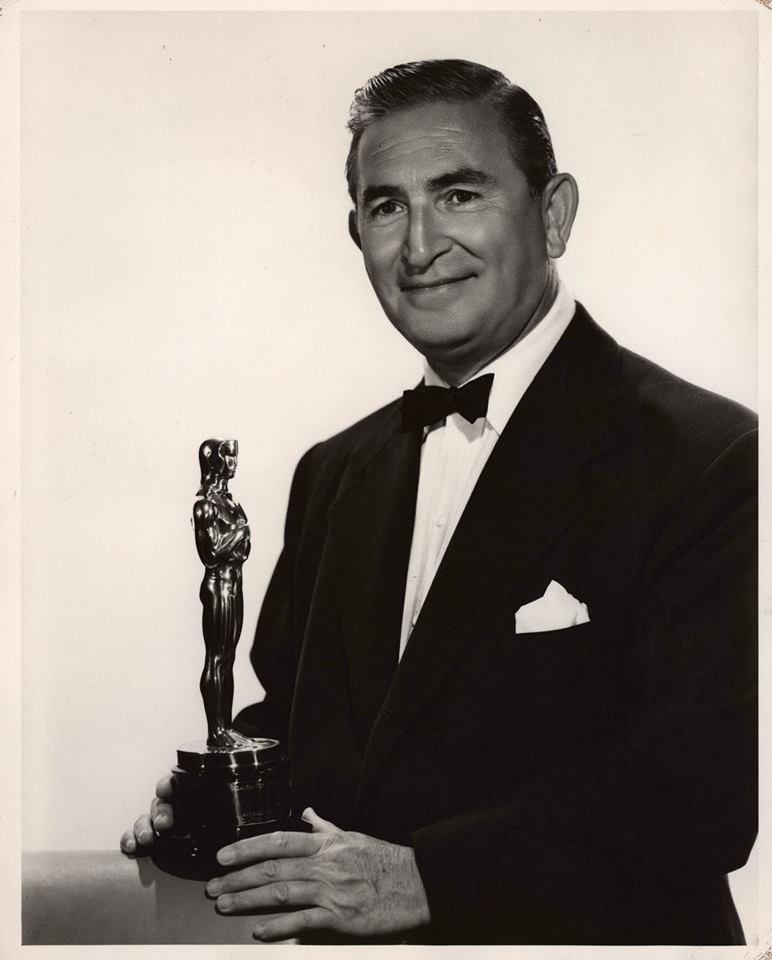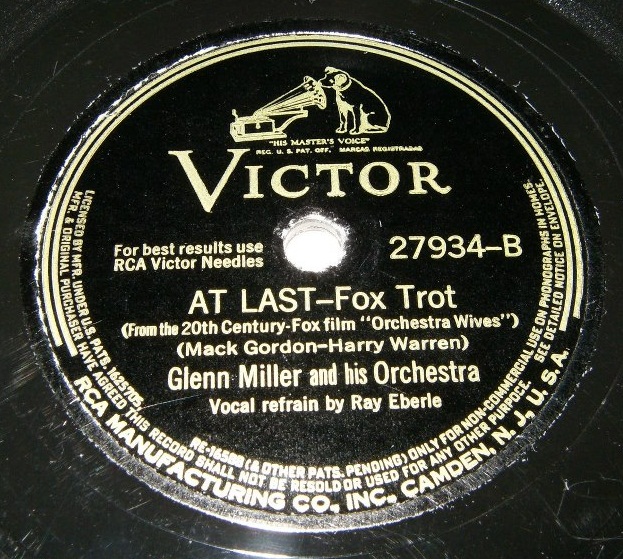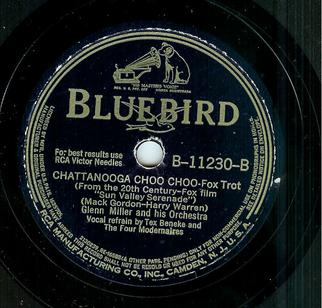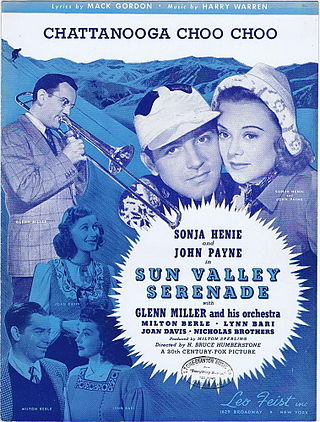BIOGRAPHICAL DETAILS
Full Name: Salvatore Anthony Guaragna
Description: Composer, USA
Known For: Hits included “I Only Have Eyes for You”, “You Must Have Been a Beautiful Baby”, “Jeepers Creepers”,
Instruments: Piano
Music Styles: Jazz
Location: United States of America
Date Born: 24th December 1893
Location Born: Brooklyn, New York, United States of America
Date Died: 22nd September 1981
Location Died: LA, California, United States of America
Cause Of Death: Heart failure
Memorial: He is interred in the Westwood Village Memorial Park Cemetery in Los Angeles. The plaque bearing Warren’s epitaph displays the first few notes of “You’ll Never Know”.
Photo Comments: This image is in the public domain.
CONTACT DETAILS
Web Site: The Harry Warren website
YOUTUBE VIDEO
BIOGRAPHICAL PROFILE
Harry Warren
Harry Warren (December 24, 1893 – September 22, 1981) was an American composer and lyricist. Warren was the first major American songwriter to write primarily for film. He was nominated for the Academy Award for Best Song eleven times and won three Oscars for composing “Lullaby of Broadway”, “You’ll Never Know” and “On the Atchison, Topeka and the Santa Fe”. He wrote the music for the first blockbuster film musical, 42nd Street, choreographed by Busby Berkeley, with whom he would collaborate on many musical films.
Over a career spanning four decades, Warren wrote more than 800 songs. Other well-known Warren hits included “I Only Have Eyes for You”, “You Must Have Been a Beautiful Baby”, “Jeepers Creepers”, “The Gold Diggers’ Song (We’re in the Money)”, “That’s Amore”, “The More I See You”, “At Last” and “Chattanooga Choo Choo” (the last of which was the first gold record in history). Warren was one of America’s most prolific film composers,and his songs have been featured in over 300 films.
Warren was born Salvatore Antonio Guaragna, one of eleven children of Italian immigrants Antonio (a bootmaker) and Rachel De Luca Guaragna, and grew up in Brooklyn, New York. His father changed the family name to Warren when Harry was a child. Although his parents could not afford music lessons, Warren had an early interest in music and taught himself to play his father’s accordion. He also sang in the church choir and learned to play the drums. He began to play the drums professionally by age 14 and dropped out of high school at 16 to play with his godfather’s band in a traveling carnival. Soon he taught himself to play piano and by 1915, he was working at the Vitagraph Motion Picture Studios, where he did a variety of administrative jobs, such as props man, and also played mood music on the piano for the actors, acted in bit parts and eventually was an assistant director. He also played the piano in cafés and silent-movie houses. In 1918 he joined the U.S. Navy, where he began writing songs.
Warren wrote over 800 songs between 1918 and 1981, publishing over 500 of them. They were written mainly for 56 feature films or were used in other films that used Warren’s newly written or existing songs. His songs eventually appeared in over 300 films and 112 of Warner Bros. Looney Tunes and Merrie Melodies cartoons. 42 of his songs were on the top ten list of the radio program “Your Hit Parade”, a measure of a song’s popularity. 21 of these reached #1 on Your Hit Parade. “You’ll Never Know” appeared 24 times.[6] His song “I Only Have Eyes for You” is listed in the list of the 25 most-performed songs of the 20th Century, as compiled by the American Society of Composers, Authors, and Publishers (ASCAP). Warren was the director of ASCAP from 1929 to 1932.
He collaborated on some of his most famous songs with lyricists Al Dubin, Billy Rose, Mack Gordon, Leo Robin, Ira Gershwin and Johnny Mercer. In 1942 the Gordon-Warren song “Chattanooga Choo-Choo”, as performed by the Glenn Miller Orchestra, became the first gold record in history. It was No.1 for 9 weeks on the Billboard pop singles chart in 1941–1942, selling 1.2 million copies. Among his biggest hits were “There Will Never Be Another You”, “I Only Have Eyes for You”, “Forty-Second Street”, “The Gold Diggers’ Song (We’re in the Money)”, “Lullaby of Broadway”, “Serenade In Blue”, “At Last”, “Jeepers Creepers”, “You’re Getting to Be a Habit with Me”, “That’s Amore”, and “Young and Healthy”.
Warren’s first hit song was “Rose of the Rio Grande” (1922), with lyrics by Edgar Leslie. He wrote a succession of hit songs in the 1920s, including “I Love My Baby (My Baby Loves Me)” and “Seminola” in 1925, “Where Do You Work-a John?” and “In My Gondola” in 1926 and “Nagasaki” in 1928. In 1930, he composed the music for the song “Cheerful Little Earful” for the Billy Rose Broadway revue, Sweet and Low, and composed the music, with lyrics by Mort Dixon and Joe Young, for the Ed Wynn Broadway revue The Laugh Parade in 1931.
He started working for Warner Brothers in 1932, paired with Dubin to write the score for the first blockbuster film musical, 42nd Street, and continued to work there for six years, writing the scores for 32 more musicals. He worked for 20th Century Fox starting in 1940, writing with Mack Gordon. He moved to MGM starting in 1944, writing for musical films such as The Harvey Girls and The Barkleys of Broadway, many starring Fred Astaire. He later worked for Paramount, starting in the early 1950s, writing for the Bing Crosby movie Just for You and the Martin and Lewis movie The Caddy, the latter containing the hit song “That’s Amore”. He continued to write songs for several more Jerry Lewis comedies.
Warren is particularly remembered for writing scores for the films of Busby Berkeley; they worked together on 18 films. His “uptempo songs are as memorable as Berkeley’s choreography, as [sic] for the same reason: they capture, in a few snazzy notes, the vigorous frivolity of the Jazz Age.”
Warren won the Academy Award for Best Song three times, collaborating with three different lyricists: “Lullaby of Broadway” with Al Dubin in 1935, “You’ll Never Know” with Mack Gordon in 1943, and “On the Atchison, Topeka and the Santa Fe” with Johnny Mercer in 1946. He was nominated for eleven Oscars.
Last years
In 1955, Warren wrote “The Legend of Wyatt Earp”, which was used in the ABC/Desilu Studios television series, The Life and Legend of Wyatt Earp. The last musical score that Warren composed specifically for Broadway was Shangri-La, a disastrous 1956 adaptation of James Hilton’s Lost Horizon, which ran for only 21 performances. In 1957, he received his last Academy Award nomination for “An Affair To Remember”. He continued to write songs for movies throughout the 1960s and 1970s but never again achieved the fame that he had enjoyed earlier. His last movie score was for Manhattan Melody, in 1980, but the film was never produced.
Warren composed a Mass, with Latin text, in 1962. This was performed a decade later at Loyola Marymount University, but it has yet to be recorded commercially.
Personal life
Warren married Josephine Wensler in 1917. They had a son, Harry Jr. (1919–1938), and a daughter, Joan (b. 1925). His wife died in 1993.
Warren died on September 22, 1981 in Los Angeles. He is interred in the Westwood Village Memorial Park Cemetery in Los Angeles. The plaque bearing Warren’s epitaph displays the first few notes of “You’ll Never Know”.
A theatre in Brooklyn, New York is named after Warren.
According to Wilfrid Sheed, quoted in Time Magazine, “By silent consensus, the king of this army of unknown soldiers, the Hollywood incognitos, was Harry Warren, who had more songs on the Hit Parade than Berlin himself and who would win the contest hands down if enough people have heard of him.” William Zinsser noted, “The familiarity of Harry Warren’s songs is matched by the anonymity of the man… he is the invisible man, his career a prime example of the oblivion that cloaked so many writers who cranked out good songs for bad movies.
At least three episodes of the Lawrence Welk Show were devoted entirely to Warren’s music: Season 18, Episode 5, October 7, 1972;[16] Season 25, Episode 10, November 24, 1979; and Season 27, Episode 17, January 2, 1982
In 1980, producer David Merrick and director Gower Champion adapted the 1933 film 42nd Street into a Broadway musical that won the Tony Award for Best Musical in 1981, ran for 3,486 performances and has had several major revivals.[19] The score incorporated songs by Warren and Dubin from various movie musicals including 42nd Street, Dames, Go Into Your Dance, Gold Diggers of 1933, and Gold Diggers of 1935.
Songs
Music by Warren, unless noted:
Academy Award nominations and winners
Winners
“Lullaby of Broadway” (1935) w. Al Dubin for Gold Diggers of 1935
“You’ll Never Know” (1943) w. Mack Gordon for Hello, Frisco, Hello
“On the Atchison, Topeka and the Santa Fe” (1945) w. Johnny Mercer for The Harvey Girls
Nominations
“Remember Me?” (1937) w. Al Dubin for Mr. Dodd Takes The Air
“Jeepers Creepers” (1938) w. Johnny Mercer for Going Places
“Down Argentina Way” (1940) w. Mack Gordon for Down Argentine Way
“Chattanooga Choo Choo” (1941) w. Mack Gordon for Sun Valley Serenade
“I’ve Got a Gal in Kalamazoo” (1942) w. Mack Gordon for Orchestra Wives
“Zing a Little Zong” (1952) w. Leo Robin for Just For You
“That’s Amore” (1953) w. Jack Brooks for The Caddy
“An Affair To Remember” (1956) w. Harold Adamson and Leo McCarey for An Affair To Remember
Broadway
“Cheerful Little Earful” (1930) w. Ira Gershwin and Billy Rose for Sweet & Low
“Would You Like to Take a Walk?” (1930) w. Mort Dixon and Billy Rose for Sweet & Low
“I Found a Million Dollar Baby (In a Five and Ten Cent Store)” (1931) w. Billy Rose and Mort Dixon for Crazy Quilt
“Ooh That Kiss” (1931) w. Mort Dixon and Joe Young for The Laugh Parade
“The Torch Song” (1931), w. Dixon and Young for The Laugh Parade
“You’re My Everything” (1931) w. Dixon and Young for The Laugh Parade
#1 hits
“By the River Sainte Marie” (1931) w. Edgar Leslie
“Too Many Tears” (1932) w. Al Dubin
“I Found a Million Dollar Baby” (1932) w. Mort Dixon
“You’re Getting to Be a Habit With Me” (1933) w. Al Dubin
“Forty-Second Street” (1933) w. Al Dubin
“Shadow Waltz” (1933) w. Al Dubin
“(You May Not Be an Angel, But) I’ll String Along With You” (1934) w. Al Dubin[22]
“Lullaby of Broadway” (1935) w. Al Dubin
“She’s a Latin from Manhattan” (1935) w. Al Dubin
“I’ll Sing You a Thousand Love Songs” (1936) w. Al Dubin
“September in the Rain” (1937) w. Al Dubin
“With Plenty of Money and You” (1937) w. Al Dubin
“Remember Me?” (1937) w. Al Dubin
“Jeepers Creepers” (1938) w. Johnny Mercer
“You Must Have Been a Beautiful Baby” (1938) w. Johnny Mercer
“Chattanooga Choo Choo” (1941) w. Mack Gordon
“My Heart Tells Me (Should I Believe My Heart?)” (1943) w. Mack Gordon
“I Had the Craziest Dream” (1943) w. Mack Gordon
“You’ll Never Know” (1943) w. Mack Gordon
“The More I See You” (1945) w. Mack Gordon
“On the Atchison, Topeka and the Santa Fe” (1945) w. Johnny Mercer
Other songs from films
“Cryin’ For the Carolines” (1929), w. Lewis and Young for Spring is Here
“Have a Little Faith in Me” (1929), lyric by Lewis and Young for Spring is Here
“Three’s a Crowd” (1932) w. Al Dubin and Irving Kahal for Crooner
“Too Many Tears” (1932) w. Al Dubin for Blessed Event
“You’re Getting To Be A Habit With Me” (1932) w. Al Dubin for 42nd Street
“Forty-Second Street” (1933) w. Al Dubin for 42nd Street
“Shuffle Off to Buffalo” (1933) w. Al Dubin for 42nd Street
“Young and Healthy” (1933) w. Al Dubin for 42nd Street
“The Boulevard of Broken Dreams” (1933) w. Al Dubin for Moulin Rouge
“(Coffee in the Morning,) Kisses in the Night” (1933) w. Al Dubin for Moulin Rouge
“Song of Surrender” (1933) w. Al Dubin for Moulin Rouge
“Build a Little Home” (1933) w. Al Dubin for Roman Scandals
“Keep Young and Beautiful” (1933) w. Al Dubin for Roman Scandals
“I’ve Got to Sing a Torch Song” (1933) w. Al Dubin for Gold Diggers of 1933
“Pettin’ in the Park” (1933) w. Al Dubin for Gold Diggers of 1933
“Remember My Forgotten Man” (1933) w. Al Dubin for Gold Diggers of 1933
“Shadow Waltz” (1933) w. Al Dubin for Gold Diggers of 1933
“We’re in the Money” (1933) w. Al Dubin for Gold Diggers of 1933
“Honeymoon Hotel” (1933) w. Al Dubin for Footlight Parade
“Shanghai Lil” (1933) w. Al Dubin for Footlight Parade
“Dames” (1934) w. Al Dubin for Dames
“I Only Have Eyes for You” (1934) w. Al Dubin for Dames
“Fair and Warmer” (1934) w. Al Dubin for Twenty Million Sweethearts
“(You May Not Be an Angel, But) I’ll String Along with You” (1934) w. Al Dubin for Twenty Million Sweethearts
“Wonder Bar” (1934) w. Al Dubin for Wonder Bar
“About a Quarter to Nine” (1935) w. Al Dubin for Go Into Your Dance
“Go Into Your Dance” (1935) w. Al Dubin for Go Into Your Dance
“She’s a Latin from Manhattan” (1935) w. Al Dubin for Go Into Your Dance
“Don’t Give Up the Ship” (1935) w. Al Dubin for Shipmates Forever
“I’d Love to Take Orders from You” (1935) w. Al Dubin for Shipmates Forever
“Lullaby of Broadway” (1935) w. Al Dubin for Gold Diggers of 1935
“Lulu’s Back in Town” (1935) w. Al Dubin for Broadway Gondolier
“The Rose in Her Hair” (1935) w. Al Dubin for Broadway Gondolier
“September in the Rain” (1935) w. Al Dubin for Stars Over Broadway
“I’ll Sing You a Thousand Love Songs” (1936) w. Al Dubin for Cain and Mabel
“With Plenty of Money And You” (1936) w. Al Dubin for Gold Diggers of 1937
“Am I in Love?” (1937) w. Al Dubin for Mr. Dodd Takes the Air
“Remember Me?” (1937) w. Al Dubin for Mr. Dodd Takes the Air
“Cause My Baby Says It’s So” (1937) w. Al Dubin for The Singing Marine
“I Know Now” (1937) w. Al Dubin for The Singing Marine
“You Must Have Been a Beautiful Baby” (1938) w. Johnny Mercer for Hard to Get
“Two Dreams Met” (1940) w. Mack Gordon for Down Argentine Way
“Boa Noite” (1941) w. Mack Gordon for That Night in Rio
“They Met in Rio (A Midnight Serenade)” (1941) w. Mack Gordon for That Night in Rio
“Chica Chica Boom Chic” (1941) w. Mack Gordon for That Night in Rio
“I, Yi, Yi, Yi, Yi (I Like You Very Much)” (1941) w. Mack Gordon for That Night in Rio
“Chattanooga Choo Choo” (1941) w. Mack Gordon for Sun Valley Serenade
“I Know Why (and So Do You)” (1941) w. Mack Gordon for Sun Valley Serenade
“It Happened in Sun Valley” (1941) w. Mack Gordon for Sun Valley Serenade
“At Last” (1941) w. Mack Gordon for Sun Valley Serenade
“I Had the Craziest Dream” (1942) w. Mack Gordon for Springtime in the Rockies
“People Like You and Me” (1942) w. Mack Gordon for Orchestra Wives
“Serenade In Blue” (1942) w. Mack Gordon for Orchestra Wives
“That’s Sabotage” (1942) w. Mack Gordon for Orchestra Wives
“There Will Never Be Another You” (1942) w. Mack Gordon for Icelan
“A Journey to a Star” (1943) w. Leo Robin for The Gang’s All Here
“No Love, No Nothin'” (1943) w. Leo Robin for The Gang’s All Here
“My Heart Tells Me” (1943) w. Mack Gordon for Sweet Rosie O’Grady
“You’ll Never Know” (1943) w. Mack Gordon for Hello, Frisco, Hello
“I Wish I Knew” with lyrics by Mack Gordon (1945) for Billy Rose’s Diamond Horseshoe
“On the Atchison, Topeka and the Santa Fe” (1945) w. Johnny Mercer for The Harvey Girls
“The More I See You” (1945) w. Mack Gordon for Diamond Horseshoe
“This Heart of Mine” (1946) w. Arthur Freed for Ziegfeld Follies
“Shoes With Wings On” (1948) w. Ira Gershwin for The Barkleys of Broadway
“Afraid to Fall in Love” (1948) w. Ralph Blane for Summer Holiday (1948)
“All Hail to Dannville High” (1948) w. Ralph Blane for Summer Holiday (1948)
“Dan-Dan-Danville High” (1948) w. Ralph Blane for Summer Holiday (1948)
“Independence Day” (1948) w. Ralph Blane for Summer Holiday (1948)
“Never Again” (1948) w. Ralph Blane for Summer Holiday (1948)
“Omar (and the Princess)” (1948) w. Ralph Blane for Summer Holiday (1948)
“Our Home Town” (1948) w. Ralph Blane for Summer Holiday (1948)
“Spring Isn’t Everything” (1948) w. Ralph Blane for Summer Holiday (1948)
“The Stanley Steamer” (1948) w. Ralph Blane for Summer Holiday (1948)
“The Sweetest Kid I Ever Met” (1948) w. Ralph Blane for Summer Holiday (1948)
“The Weary Blues” (1948) w. Ralph Blane for Summer Holiday (1948)
“While The Men Are All Drinking” (1948) w. Ralph Blane for Summer Holiday (1948)
“Wish I Had A Braver Heart” (1948) w. Ralph Blane for Summer Holiday (1948)
“You’re Next” (1948) w. Ralph Blane for Summer Holiday (1948)
“My One and Only Highland Fling” (1949) w. Ira Gershwin for The Barkleys of Broadway
“My Dream Is Yours” (1949) with Ralph Blane, title song for My Dream Is Yours
“(The Same Thing Happens with) The Birds and the Bees” (1956) Mack David for The Birds and the Bees
“I Wanna Be A Dancing Man” (1952) w. Johnny Mercer for The Belle of New York (also seen in That’s Entertainment! III)
“I’ve Come to California” (1957) w. Harold Adamson for The Californians television series on NBC
American songbook songs
In his book American Popular Song, Alec Wilder notes that Warren “wasn’t in the category as the best theater writers, but he certainly was among the foremost pop song writers.” He discusses songs he likes: “Would You Like To Take A Walk” (1930), “I Found A Million Dollar Baby” (1931), “You’re Getting To Be A Habit With Me” (1932), “Summer Night” (1936), “There Will Never Be Another You” (1942), “Serenade in Blue” (1942), “At Last” (1942), “Jeepers Creepers” (1938), and “The More I See You” (1945).
Other popular songs
“Rose of the Rio Grande” (1922) w. Edgar Leslie m. with Ross Gorman
“(Home in) Pasadena” (1923) w.m. Harry Warren, Grant Clarke and Edgar Leslie
“I Love My Baby” (1925) w. Bud Green
“I’m Lonely Without You” (1926) w. Bud Green
“Where Do You Work-a, John?” (1926) w. Mortimer Weinberg and Charley Marks
“Ya Gotta Know How to Love” (1926) w. Bud Green
“Away Down South in Heaven” (1927), W. Bud Green
“Nagasaki” (1928) w. Mort Dixon
“Where the Shy Little Violets Grow” (1928), w. Gus Kahn
“Absence Makes the heart Grow Fonder for Somebody Else” (1929), w. Sam M. Lewis and Joe Young
“Tellin’ It to the Daisies” (1930) w. Joe Young
“By the River Sainte Marie” (1931) w. Edgar Leslie
“Devil May Care” (1940) w. Johnny Burke
of which was the first gold record in history).
One of America’s most prolific film composers, Warren’s songs have been featured in over 300 films.
Warren wrote over 800 songs between 1918 and 1981, publishing over 500 of them.
They were written mainly for 56 feature films or were used in other films that used Warren’s newly written or existing songs.
His songs eventually appeared in over 300 films and 112 of Warner Brothers “Looney Tunes” cartoons.
His songs were on the top ten list of the radio program “Your Hit Parade”, a measure of a song’s popularity. 21 of these reached #1 on Your Hit Parade. “You’ll Never Know” appeared 24 times.
Warren is particularly remembered for writing scores for the films of Busby Berkeley; they worked together on 18 films.
The 1980 stage musical 42nd Street showcases his popular songs from these films.
Warren won the Academy Award for Best Song three times, collaborating with three different lyricists: “Lullaby of Broadway” with Al Dubin in 1935, “You’ll Never Know” with Mack Gordon in 1943, and “On the Atchison, Topeka and the Santa Fe” with Johnny Mercer in 1946. He was nominated for eleven Oscars.
Warren died on September 22, 1981 in Los Angeles.
Song include
“By the River Sainte Marie” (1931) w. Edgar Leslie
“Too Many Tears” (1932) w. Al Dubin
“I Found a Million Dollar Baby” (1932) w. Mort Dixon
“You’re Getting to Be a Habit With Me” (1933) w. Al Dubin
“Forty-Second Street” (1933) w. Al Dubin
“Shadow Waltz” (1933) w. Al Dubin
“I’ll String Along With You” (1934) w. Al Dubin
“Lullaby of Broadway” (1935) w. Al Dubin
“She’s a Latin from Manhattan” (1935) w. Al Dubin
“I’ll Sing You a Thousand Love Songs” (1936) w. Al Dubin
“September in the Rain” (1937) w. Al Dubin
“With Plenty of Money and You” (1937) w. Al Dubin
“Remember Me?” (1937) w. Al Dubin
“Jeepers Creepers” (1938) w. Johnny Mercer
“You Must Have Been a Beautiful Baby” (1938) w. Johnny Mercer
“Chattanooga Choo Choo” (1941) w. Mack Gordon
“My Heart Tells Me (Should I Believe My Heart?)” (1943) w. Mack Gordon
“I Had the Craziest Dream” (1943) w. Mack Gordon
“You’ll Never Know” (1943) w. Mack Gordon
“The More I See You” (1945) w. Mack Gordon
“On the Atchison, Topeka and the Santa Fe” (1945) w. Johnny Mercer
Extarnnal links:
- The Harry Warren website
- Biography at the Encyclopedia of Composers and Songwriters
- Chronology of some of Warren’s best-known songs
- Harry Warren at the Songwriters Hall of Fame
- Harry Warren at the Internet Movie Database
- Harry Warren at the Internet Broadway Database
- Harry Warren at the TCM Movie Database Harry Warren: America’s Foremost Composer (1933)
- Biography at Guide to Musical Theatre
- HarryWarrenMusic.com site
- Italian Tribute at Harry Warren – By Calabresi.net – Calabrians in the Worlds
- Harry Warren at Find a Grave




